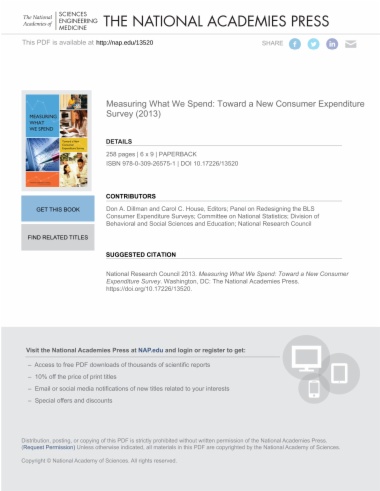

The Consumer Expenditure (CE) surveys are the only source of information on the complete range of consumers' expenditures and incomes in the United States, as well as the characteristics of those consumers. The CE consists of two separate surveys: (1) a national sample of households interviewed five times at three-month intervals; and (2) a separate national sample of households that complete two consecutive one-week expenditure diaries. For more than 40 years, these surveys, the responsibility of the Bureau of Labor Statistics (BLS), have been the principal source of knowledge about changing patterns of consumer spending in the U.S. population.
In February 2009, BLS initiated the Gemini Project, the aim of which is to redesign the CE surveys to improve data quality through a verifiable reduction in measurement error with a particular focus on underreporting. The Gemini Project initiated a series of information-gathering meetings, conference sessions, forums, and workshops to identify appropriate strategies for improving CE data quality. As part of this effort, BLS requested the National Research Council's Committee on National Statistics (CNSTAT) to convene an expert panel to build on the Gemini Project by conducting further investigations and proposing redesign options for the CE surveys.
The charge to the Panel on Redesigning the BLS Consumer Expenditure Surveys includes reviewing the output of a Gemini-convened data user needs forum and methods workshop and convening its own household survey producers workshop to obtain further input. In addition, the panel was tasked to commission options from contractors for consideration in recommending possible redesigns. The panel was further asked by BLS to create potential redesigns that would put a greater emphasis on proactive data collection to improve the measurement of consumer expenditures. Measuring What We Spend summarizes the deliberations and activities of the panel, discusses the conclusions about the uses of the CE surveys and why a redesign is needed, as well as recommendations for the future.